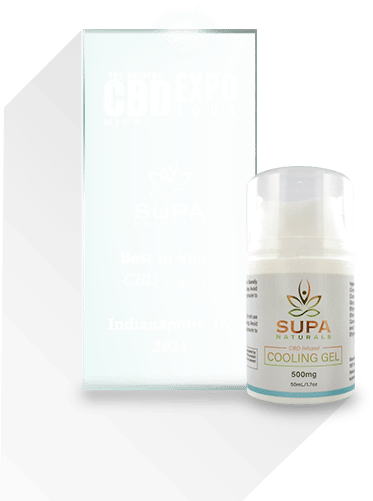Is CBD Oil Addictive?
The CBD industry is growing by the day, with predictions purporting $16 billion in the United States by 2025. Due to numerous CBD benefits, this plant extract is becoming ubiquitous in beauty products, toothpicks, and even cheeseburgers.
CBD or cannabidiol comes from cannabis, which has both therapeutic and medical uses. The substance is taking wing globally for use against chronic pain, inflammation, anxiety, and psychosis. However, many people wonder about the addiction factor as pop culture adds disinformation to the mix.
Can CBD oil be addictive?
We’ll let you answer that for yourself as you read about CBD oil history and its most impressive features. Our experts cover the facts about cannabis and hemp oil, how CBD works, and whether it is safe to use CBD oil daily.
Where Does Cannabidiol (CBD) Originate?
Cannabidiol is one of the most prominent compounds in the cannabis plant. It is different in structure from tetrahydrocannabinol (THC), another compound found in the plant. Cannabidiol also has slightly different features, including a lack of the psychoactive effects found in THC.
CBD is one compound within the cannabis plant, classified as either hemp or marijuana (hemp plants have less than 0.3% THC content). It’s the same type of plant, Cannabis Sativa, but in different strains for various uses.
CBD oil typically comes from the flowers, leaves, and steam of this cannabis plant, whereas hemp seed oil derives only from the seeds. Full-spectrum oils include traces of THC, but you will also find several THC-free products at SUPA Naturals.
What is Hemp?
Do you want to understand CBD oil and its features? A great place to start is with terms like hemp, marijuana, and cannabis. These words often feature interchangeably, but misinformation about the origins might create confusion as you’re exploring the CBD products on offer.
- Cannabis refers to the plant, Cannabis Sativa. Hemp and marijuana are different strains of this same plant species.
- Hemp refers to the cannabis strain with less than 0.3% THC content. Most hemp products use the fibrous elements of the plant, extracted from the stem to create rope, fabrics, and other materials. Hemp CBD oil may contain no THC at all.
- Marijuana plants have higher THC content. Marijuana CBD oil and other products offer full-spectrum effects upon application or consumption.
Both marijuana and hemp derive from Cannabis Sativa but feature unique chemical components and uses. Hemp is more popular in industrial applications because it is versatile and renewable. It is also easy to grow and requires less maintenance, water, and pesticide treatments.
How is CBD Oil Made? (The Extraction Techniques)
Many people who don’t want to feel intoxicated turn to CBD for the therapeutic and relaxation benefits.
There are a few methods to extract CBD oil from the cannabis plant, all of which require sterile laboratory equipment and a specialized team.
The most common extraction methods are distillation, liquid extraction, CO2, winterization, and oil infusion.
Distillation
Each CBD oil component has a specific boiling point. Boiling off those elements with lower thresholds creates a more refined CBD oil, a process known as short path distillation.
Liquid Extraction
Simple and cost-effective, liquid extraction is also a common technique for CBD oil. The method needs the right tools and extra patience as liquids contain many impurities, including hexane, butane, and ethanol.
CO2
Carbon dioxide extraction is the most popular technique for making CBD oil. It combines the cannabis plant and the CO2 in a container under a certain pressure. The liquid carbon dioxide absorbs the plant, and the combined substance then turns into a gas. Purer oil is the by-product.
Winterization
The winterization procedure removes lipids, fats, and wax from within the plant material. For this to work, you need to extract the oil at a high temperature and combine it with alcohol as a base.
Initially, you will need to place the oil in the fridge for a few hours before continuing with filtration. An extraction jar and filter paper removes the heavier elements, and heating the substance at the right temperature dissolves the excess alcohol.
Oil Infusion
Oil infusion is a traditional extracting method, heating the plant at one hundred degrees Celsius. Add carrier oil (avocado or olive oil), and let it stand for one to two hours. The only drawback with this method is that the carrier oil doesn’t evaporate from the blend, so choose wisely.
CBD Oil vs. Hemp Oil: What is The Difference?
CBD oil is a health supplement, providing all the benefits of cannabis in a highly concentrated form. If there is no THC, such as in some CBD isolates, it will not produce mind-altering effects.
The seeds are some of the most nutritious and versatile components, offering numerous health benefits. Seed oil is usually the main ingredient for food or cosmetic hemp products for the omega-3 polyunsaturated fatty acids, omega-6, and vitamins.
If the oil is made from the leaves, the outcome will usually be THC-free CBD oil, primarily for medicinal purposes.
Even though these oils derive from the same plant (Cannabis Sativa), each contains unique biochemical components. The different oils have different effects on the mind and body.
How Does CBD Work?

CBD impacts the endocannabinoid system with various receptors spread throughout the brain and body, including CB1 and CB2 receptors. CB1 receptors support the central nervous system, while CB2 receptors are part of the immune system and some blood cells.
The CB1 receptors deal with liver processes and impact our appetite, pleasure, and pain tolerance. These receptors release neurotransmitters, which govern how our body functions and feels. THC effectively activates both CB1 and CB2 receptors, while CBD only stimulates these two receptors indirectly.
While the consummation of cannabis with THC directly activates CB1 and CB2, CBD oil targets only the adenosine and serotonin receptors for pain relief and anxiety. When people take a higher CBD dose, it may also activate another serotonin receptor, 5-HT1A, which has antidepressant effects.
What is THC and How Does It Differ From CBD in How It Affects Your Body?
THC or tetrahydrocannabinol is the compound in cannabis that activates psychoactive side-effects. When people use marijuana, the high content of THC attaches to cannabinoid receptors that influence coordination, thinking, and memory.
Tetrahydrocannabinol can affect your mind and body in various ways due to its powerful trigger of CB1 and CB2 receptors. Regular consumers experience a “high,” including changes in perception, thought processes, and even hallucinations. When someone consumes THC, the effects will usually start ten to twenty minutes later, lasting up to two hours.
General THC effects include:
- Sedation
- Relaxation
- Euphoria
- Pain relief
The THC amount depends on various factors such as air exposure and plant cultivation. Hemp is one cannabis type with a low THC concentration (less than 0.3%).
Marijuana products are higher in THC, but hemp products sometimes contain traces of this compound. Even though people sell and use THC throughout the United States for recreation (in some states), it does have side effects, including:
- A fall in IQ with higher THC dosage (especially in younger brains)
- Memory loss and other cognition problems
- Impaired motor skills (avoid driving any vehicle while under the influence of THC)
- Schizophrenia as a result of regular use
- Dangerous interactions with other substances or medicines
Despite the potential side effects and risks, some medical evidence proves marijuana (and THC) can relieve symptoms in cancer patients. Researchers are developing FDA-approved drugs by extracting THC from the marijuana plant to benefit oncology patients worldwide.
The psychoactive components of THC are where its controversy lies. It is not legal for use in every state, and there are risks involved with overexposure. CBD is safer and gives some of the same benefits.
Does CBD Oil Work?
The CBD benefits continue to make radical changes in medicine and wellness. Scientists, medical experts, and consumers increasingly experience the CBD benefits, so it is only a matter of time before it becomes a regular component of the modern routine.
While the research opportunities are plentiful, there is already ample evidence that CBD oil does work to relieve pain, control blood pressure, improve heart health, and treat anxiety.
Pain Management
CBD oil is effective for managing and treating pain caused by various conditions. The endocannabinoid system in our body regulates appetite, sleep, and pain response, so the oil impacts this system to reduce inflammation and relieve chronic pain.
Research is yet to conclude the extent to which CBD oil helps with multiple sclerosis and arthritis, but the results are promising.
Blood Pressure and Heart Health
CBD is a natural and effective treatment for people who suffer from high blood pressure. CBD oil can also relieve stress and anxiety, which are closely related to heart attacks and seizures. With the right CBD oil dosage, patients may be able to decrease the blood pressure and prevent heart-related conditions.
Brain Health
The Alzheimer’s Association predicts that by 2050 more than 14 million Americans will be diagnosed with this debilitating brain disease. Recent studies highlight CBD oil benefits in this regard, including how it can support brain health. There’s clear evidence that CBD can protect the brain from deterioration and prevent progressive damage by stimulating and generating new brain cells. Other studies are still in the process of determining whether CBD oil can also help patients suffering from multiple sclerosis and epilepsy.
Due to CBD’s high anti-inflammatory and antioxidant properties, people also use the oil as a natural way to promote overall wellness.
Anxiety and Insomnia
For years, CBD oil has treated PTSD, insomnia, and anxiety since it can directly impact the serotonin receptors and regulate social behavior, energy, and mood. It is also a natural antidepressant.
Support for Patients with Cancer
Numerous studies support CBD oil’s efficacy in relieving cancer symptoms. For example, patients who undergo chemotherapy consume CBD to ease pain and nausea. Others report that CBD oil alleviates general discomfort.
Treats Acne
The Journal of Clinical Investigation reported that CBD oil treats skin inflammation effectively and reduces acne. CBD reduces sebum production and the activation of cytokines (secreted proteins), so many natural-based beauty brands incorporate it into their products to help consumers maintain healthy skin.
Is It Possible to Overdose with CBD?

There is no universal dosage of daily CBD—it depends wholly on your needs and reasons for using it. There are also no reports of overdoses on any CBD product, and it is safe to consume.
Before you decide to use CBD oil, consult your doctor for a recommended dosage based on your condition, symptoms, or illness. If you experience adverse reactions, reduce the dosage and seek advice from a trusted medical professional on how to proceed.
Is It Safe to Use CBD Oil Daily?
CBD products are not addictive. CBD oil and related products are safe for anyone to use daily in the right dosage. In theory, anyone who suffers from anxiety or pain may benefit from regular CBD consumption.
Its activation of endocannabinoids enhances our immune system. If there is a decrease in endocannabinoids, our body may become more susceptible to diseases and lead to disruptions in appetite, mood, and sleep habits. CBD oil counteracts these symptoms, keeping many conditions at bay, including physical disorders, anxiety, and depression.
Is CBD Oil Addictive?
If you are looking for a way to treat mental disorders (stress or depression) or physical pain, it is natural to want to cure those conditions. Is CBD oil addictive? The answer is no.
Clinical research by the World Health Organization reports that CBD oil is not addictive or prone to dependency behaviors. By finding your optimal dosage, you won’t form an abusive habit or dependency on CBD products.
Choose Supa Naturals for CBD Oil Today
Selecting CBD oil as your preferred product depends on why you want to use it. It is also your choice how often or how much you will consume your CBD products to achieve the desired effects.
Let SUPA Naturals CBD oil change your quality of life, relieving pain, anxiety, depression, and much more. Our mission is to help people create healthier lifestyles, and CBD oil is pivotal in that pursuit. Peruse our online shop for more CBD products and helpful advice.
For more information, visit our website or contact [email protected]. High-quality CBD might be the answer you’ve been trying to find.






